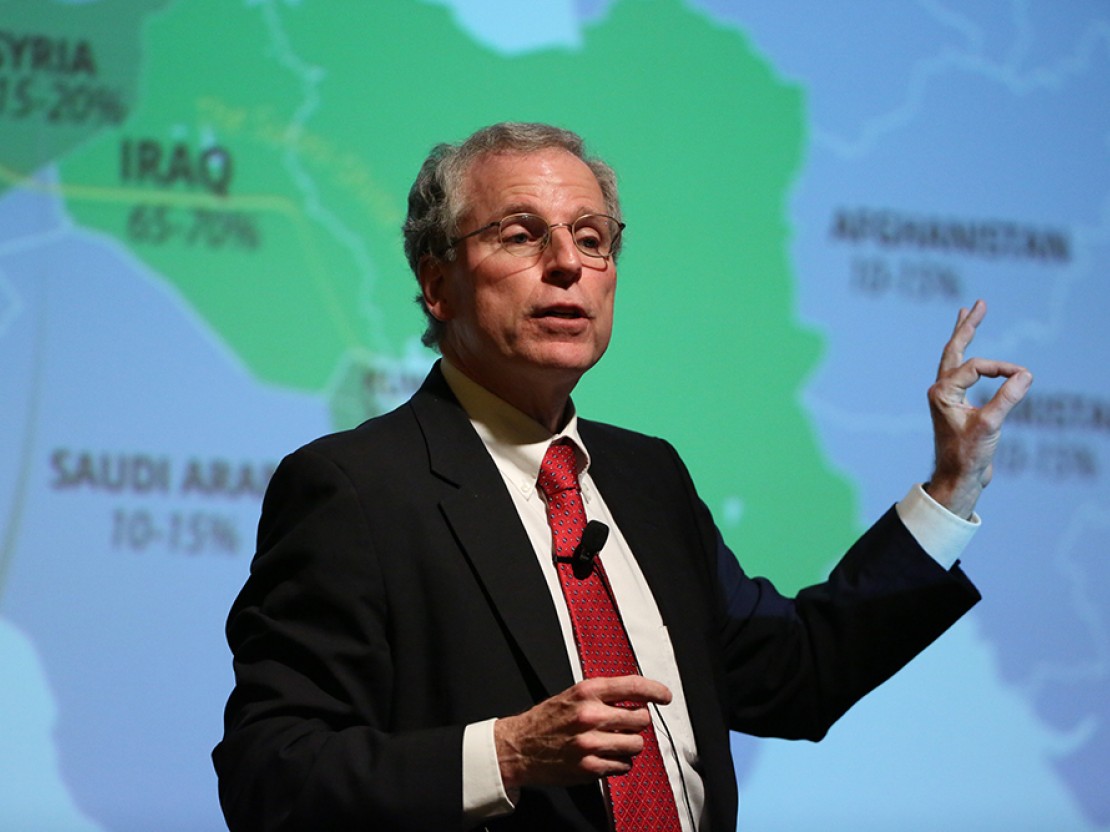Shortly after the outbreak of Syria’s civil war, Robert Ford traveled to the city of Hama in a show of solidarity with Syrians protesting the rule of Bashar Al Assad. Former U.S. Ambassador to Syria (2010-2014), Ford subsequently worked closely with Syrian opposition forces and was instrumental in bringing them to the Geneva peace talks. Currently a Senior Fellow at The Middle East Institute, Ford also served as U.S. Ambassador to Algeria (2006- 2008).
In the following excerpt from a talk given this spring at the Athenaeum, he explores the historical, political, religious, and sectarian context of the conflict in the region, the rise of the Islamic State, and the efficacy of U.S. policy in the region.
To watch a video of his entire talk, visit http://cmc.edu/mmca/athvideos.php
President Barack Obama last summer said things are so serious now with the Islamic State taking the city of Mosul, coming all the way down to the outskirts of Baghdad, that American military operations are necessary. So what I’d like you all to think about is the American goal in this. What is the strategy, and does it make sense?
We have American planes bombing daily in Iraq. What are we trying to do? Are we trying to destroy the Islamic State? Are we trying to contain it? Are we trying to degrade it? I have heard different people from the same administration use all three words. I myself am a little confused. So if it’s to contain it, you would have one strategy. If it’s to destroy it, you might have a different strategy. For example, if it’s to contain it, then maybe the Iraqi armed forces don’t need to be so good. We bring them up to a certain level and then we can get out. But if the strategy is to destroy it, maybe the Iraqi armed forces need to be a lot better, and that requires a bigger commitment from us in terms of training, supplies, equipment. If the strategy is to destroy it, how do you destroy an idea among Sunnis that they’re under attack (from Shia Muslims and their allies)?
Barack Obama last summer said we need Sunni and Shia to reconcile, that they have to be able to get along. And he said there’s no way the Americans can do that for them. They are going to have to do that for themselves. But if you want reconciliation, how then do you destroy the Islamic State without dealing with that question of, “We’re under attack and we’re fighting back?” So that becomes a question of strategy. Is bombing the strategy? Does the bombing lead to reconciliation? Again, I ask you to think about that.
I know there are some people in Washington who think we have to be involved in Iraq to contain and reduce Iranian influence in Iraq. We lost 4,000 of our best young people fighting the war in Iraq between 2003 and 2011. Are we now just supposed to see Iraq become a satellite state of Iran? Is that what 4,000 of our best young people died for? I don’t think anyone in the United States would make that argument. So, is the purpose, then, of what we’re doing in Iraq not the Islamic State, not Sunni grievances, but rather to contain Iran? Again, how does the bombing fit in with that? I don’t have an immediate answer to this question but I think all Americans and our representatives in Congress need to be asking this.
During the Vietnam War, whenever things got hard for the Vietnamese resistance against the Americans and against the South Vietnamese, they retreated into Cambodia and Laos. Did anyone think the Islamic State was going to stay in Syria? They came out of Syria into Iraq in 2014. So what are we doing about this? What are we doing about Syria? Can we destroy the Islamic State in Iraq if it’s still existing in strength right next door in Syria? I’ve been along this border. It’s nothing. It’s just sand. There’s no fence. There are no cameras. There’s nothing. It’s just desert. You don’t even know when you cross from one country to the other. Maybe on some of the few paved roads, but there are very few paved roads out there. Mostly it’s just open scrub desert. And of course, historically, for thousands of years, Arab nomadic tribes used to go back and forth. This border didn’t even really exist until 1923. So how, again, does the strategy fit with the goal?
I mentioned President Obama said there needs to be reconciliation between Sunnis and Shia. Remember, the Sunnis think they’re under attack. Right now if you watch the news coming out of Iraq, you will certainly hear about Shia militia. Why? These are militias that are armed by Iran. They are heavily influenced by Iran, and they have a tendency, historically and currently, to burn the homes of the Sunnis who were there. In some cases they are guilty of mass executions. There are also incidents where they have kidnapped Sunni Arabs and held them for ransom. Human Rights Watch just issued a report documenting the problems that the Shia militia are causing with respect to political reconciliation in Iraq.
The President says there needs to be reconciliation but what the Shia militia are doing on the ground is making it much more difficult. Again, we’re bombing, Shia militia are doing this. Does this strategy make sense?”
